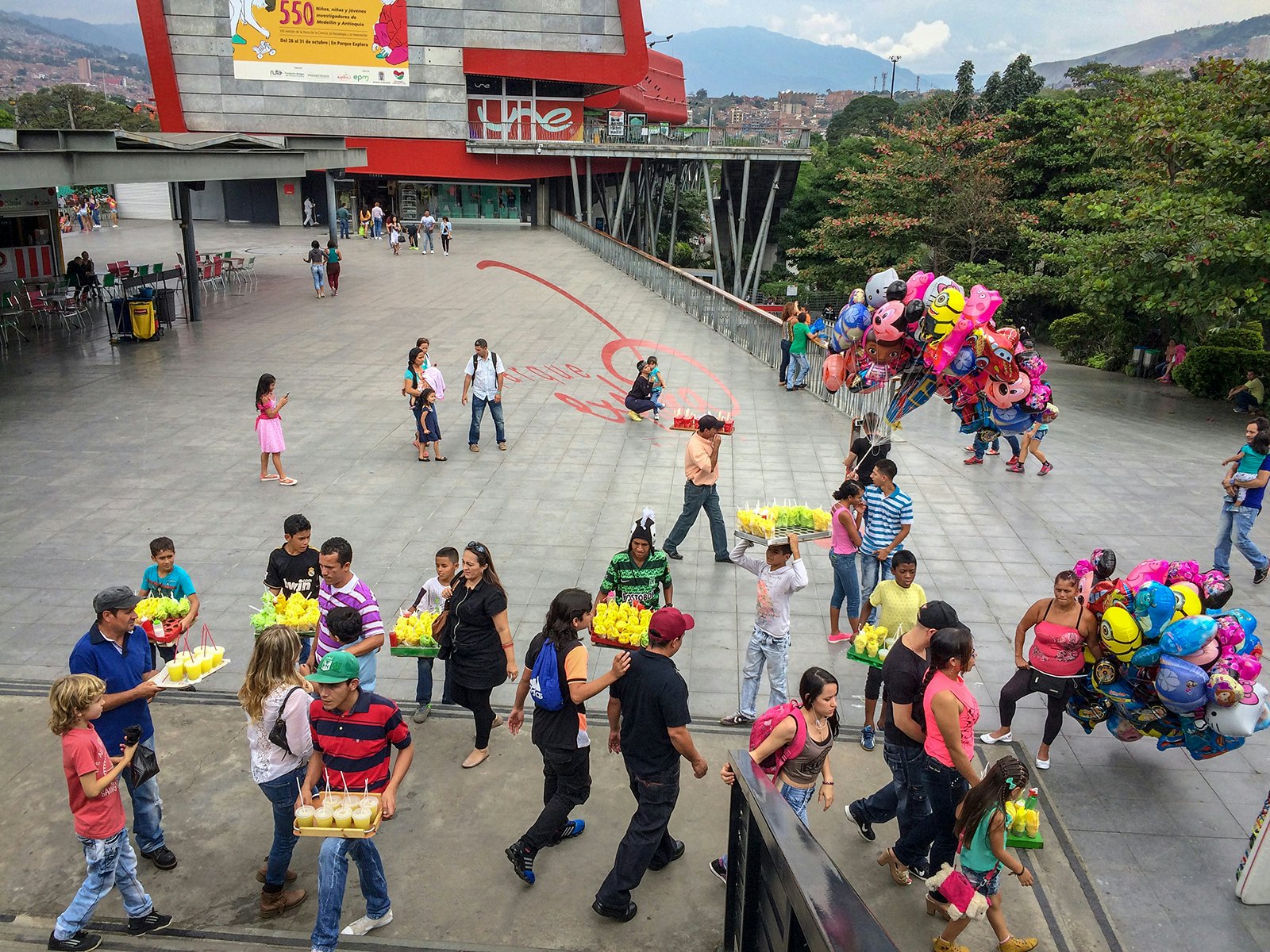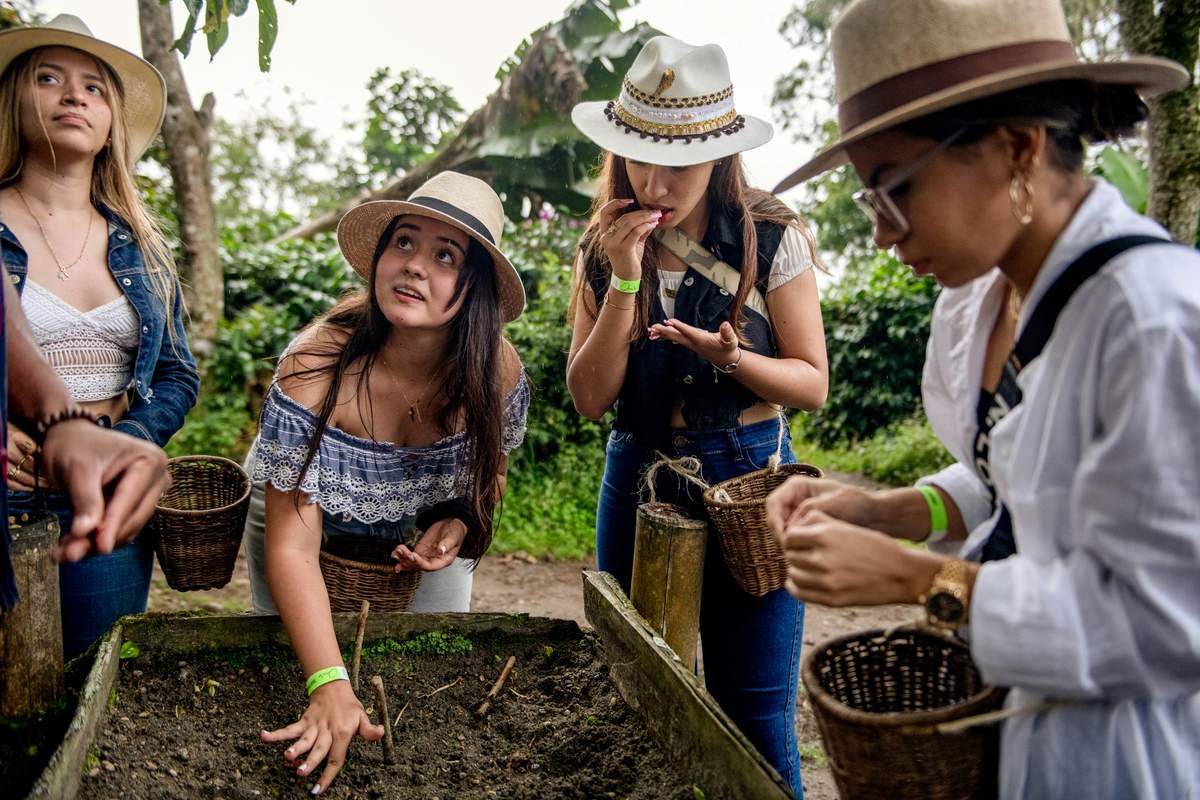

Cable car from Danto Domingo Savio, Medellín.
Word is officially out: Medellín has wholly transcended its unfavorable reputation and undergone a veritable renaissance. Yet somehow, it's failing to land on many travel bucket lists.
Still an unsung corner of South America, there’s a lot to love about Medellín, past and present – make your move before the headlines catch up.

An urban planning success story
Medellín is nothing if not a forward thinking city. A complicated past has shaped the present and there's still work left to be done, but the Medellín of today is nearly unrecognizable from Medellín a few decades past. Revitalized and buzzing, the city now boasts safe, art-drenched streets, world-class cultural attractions and one of the most advanced public transit systems in the world. For a couple pesos (less than $1 USD), tourists and commuters alike can board the mile-long Metrocable for a gondola glide above the commotion of the streets and take in serene aerial views of the hillside city.
In addition, a tram winds through all major sections of Medellín and outdoor escaleras criss-cross outlying hillside communities, allowing residents and visitors alike to traverse their surroundings with ease. These transportation initiatives were originally installed to connect the low-income comunas skirting the city to opportunities in other parts of Medellín, successfully stimulating economic mobility with public transit.

The paisa cuisine of Medellín
Colombia's famed coffee is often the star of the show, but the country's cuisine extends much further than its famed cuppas. While typical rice-and-bean combinations appear on every menu, expect to indulge in flavorful culinary specialties specific to Medellín. There are a few twists that make the region's food unique: namely, their love for pork belly. A twirl of chicharrón will adorn your plate at every breakfast if you’re doing it right. This fried meat is one of the main components of a hearty bandeja paisa, the traditional dish of the region (bandeja is Spanish for platter, while paisa refers to the Paisa section of northwest Colombia). Other savory delights you might find on a bandeja paisa include carne molida (ground beef), fried eggs, plantains, chorizo, arepas (corn cakes), and avocado. Pop into an unassuming and entirely authentic eatery like Restaurante Santas Melonas (Carretera 43b #10-2) and chow down on a plate of Medellín’s most mouthwatering offerings at some of the most reasonable prices in the city.

Public art and colorful murals
Botero sculptures – chunky and lovable as they are – aren’t the only art masterpieces available for public enjoyment in Medellín. Like many places that have faced harsh and unforgiving circumstances, Medellín has carved a way forward through creative expression. From monuments to murals, the public art scene sweeping Medellín is stunning in its scope and ingenuity. Nowhere is this exemplified better than in the previously marginalized neighborhood of Comuna 13. On par to rival Miami’s Wynwood Walls and tucked away up a hillside, Comuna 13 is part residential community, part outdoor art gallery. Elaborate murals grace wall after wall, a series of vivid canvases brought to life by passionate and dedicated artists. What was once the city’s roughest section has evolved into its most colorful; it’s a celebration of rebirth, a brave determination to metamorphose – and it’s Instagram gold.
Prefer to spend the day inside? For more Botero, spend a few hours at Museo de Antioquia, one of the most important cultural attractions in Medellín and arguably one of the best art museums in the country. It contains a large collection of Botero still life and sculptures. Don’t miss Museo Casa de la Memoria, which gently dissects the past century or so in Colombia, if you want a fuller picture of Medellín’s history. To keep the mood light, follow that up with a swing by Casa Gardeliana, a small and whimsical museum dedicated to tango music.

Eco-conscious exploring
Above the clouds that hug Medellín’s outskirts – and just a short cable car ride away – mountaintop Parque Arví awaits as an eco-tourist’s paradise. The park, along with in-city green spaces like the Jardín Botánico de Medellín, helps position Medellín as an ideal spot for combining city breaks and outdoor escapes. Visitors to Parque Arví can hike, picnic, go birdwatching, shop handicrafts and food specialties at Arví Market, and spend time soaking up the balmy weather that earns Medellín the nickname “City of Eternal Spring.”

Accessible and diverse: a destination for all travelers
Like many cities in Latin America, Medellín is the kind of place that rumbas in the streets ‘til dawn, but still rises with the early birds for a tinto and the morning paper. Perhaps that has something to do with the influx of an unexpected demographic: retirees. Drawn by the comparatively affordable cost of living and superb public health care system, sexagenarians are flocking to Medellín for a chance to live the high life.
That same appeal draws budget-conscious travelers and weekend warriors from all over, and Medellín has nigh 100 hostels dotting the city to show for it. The lively El Poblado neighborhood in particular beckons to backpackers, as accommodations like Hostal Lleras Calle 8 provide front-porch access to the best of Medellín nightlife. Revelers can sip aguardiente from a bottle of Antioqueño (except around a presidential election, when the sale and consumption of alcohol can be banned – fun fact) and take in the celebratory vibe that makes this area the place to be.














